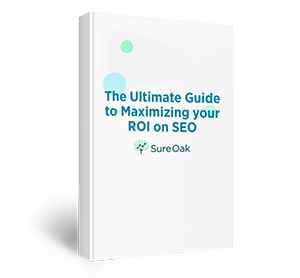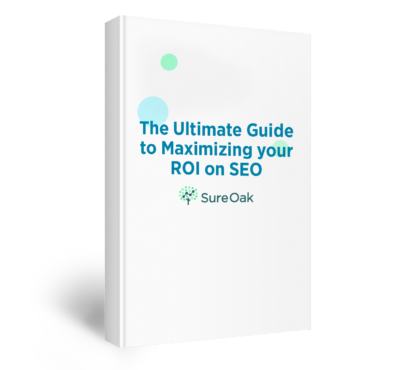The FinTech industry is booming like never before, with hundreds of rising companies offering innovative solutions for financial services. However, with so much competition in the market, how can FinTech companies stand out and attract more customers? The answer is search engine optimization (SEO).
In this article, we will explain what FinTech is, how SEO and FinTech work together, and why it is necessary to have an SEO strategy for a FinTech company. Plus, we’ll provide the top 5 FinTech SEO strategies to help any company succeed, so keep reading to learn more.
How SEO and FinTech Work Together
SEO stands for search engine optimization, and it is the process of improving the visibility and relevance of a website in the organic search results of search engines like Google and Bing. SEO is an excellent marketing tool for any company, but especially for FinTech companies. In the increasingly-saturated FinTech market, your business must stand out when customers are searching for solutions. SEO helps you do just that, increasing your chances of potential leads finding your website or product.
The Benefits of SEO for FinTech Companies

Using SEO brings many benefits to FinTech companies, such as:
- Increasing brand awareness and credibility
- Driving more traffic and leads to one’s website
- Converting more visitors into customers
- Building trust and loyalty with the target audience
- Enhancing user experience and satisfaction
- Reducing customer acquisition costs
- Staying ahead of the competition
Why is it necessary to have an SEO strategy for a FinTech company?
An SEO strategy for a FinTech company is beneficial and necessary. The FinTech industry is highly competitive and dynamic, with new players entering the market daily. Therefore, you need to have a strong online presence and authority in your niche to stand out from the crowd. Additionally, the FinTech audience is savvy and sophisticated, with high expectations and demands. To attract and retain them, you need to provide valuable and relevant content that answers their questions and solves their problems — and ideally, do so before they turn to other solutions.
The landscape of this industry is also constantly evolving, with new technologies and regulations emerging regularly. To keep up with the changes, you must monitor the latest trends and best practices in SEO and FinTech and adapt your strategy accordingly.
Top 5 FinTech SEO Strategies
Now that you know how SEO and FinTech work together and why it is necessary to have an SEO strategy for a FinTech company, let’s look at the top 5 FinTech SEO strategies that can help you stand out.
1. Conducting Keyword Research
Keyword research is the foundation of any SEO strategy, as it helps you identify the words and phrases that your potential customers use to search for your products or services online. Keyword research can help you:
- Understand your target audience’s needs, intents, preferences, and behaviors
- Discover new opportunities and gaps in the market
- Optimize your website content for relevant keywords that match your audience’s search intent
- Create content topics and ideas that resonate with your audience
Keywords come in single-word to short-phrase lengths and brand-name and non-brand-name forms. Make sure to use a mix of these types of keywords and incorporate them into the relevant copy on your website (e.g., blog posts, landing pages, headings, meta descriptions). Having these keywords and phrases on your site then makes it more likely for your page to appear in potential customers’ search results.
2. Creating High-Quality Content
Content is the core of SEO, as it helps you provide value and information to your audience, showcase your expertise and authority, and persuade your visitors to take action. High-quality content, especially when crafted by expert content writing services, allows you to:
- Achieve higher engagement rates
- Build a loyal community around your brand
- Boost your brand awareness
- Rank higher in search engines and drive more organic traffic to your website
- Become an authority in your market
- Encourage social sharing and word-of-mouth referrals
- Generate more leads and conversions, ultimately increasing your revenue
To create high-quality content as a part of your SEO strategy, consider these tips:
- Define your content goals and objectives– What do you want to achieve with your content? Who do you want to reach with your content? How do you want to measure your content success? Clearly answer these questions to know where to start.
- Know your audience– To reach the right audience, you need to know who they are, what their needs are, how they behave, and where they are located.
- Choose your content formats– Choose whether blog posts, ebooks, white papers, case studies, webinars, podcasts, videos, infographics, etc., are right for your audience.
- Plan your content topics and ideas– Brainstorm what kind of content you think would be relevant and engaging to your audience, as well as what content aligns with your business identity, goals, and budget. Then, consider how your content can also add value to your audience’s lives.
- Remain relevant– Ensure you’re following your niche’s current SEO content trends. Research topics like ‘FinTech SEO trends 2024’ and ‘FinTech trends’ and see how you can align your content to these norms.
- Create your content calendar– Planning in advance is essential to post quality content regularly. Create and maintain a content calendar outlining what posts, platforms, and schedules you will use.
- Create your content– Make sure you have the tools to create quality content, whether that be video equipment, writing assistance, or illustration software. Don’t be afraid to outsource content creation to the experts if you lack the skills.
- Edit and proofread your content– Make sure to check your content for errors, inconsistencies, readability, and quality, depending on the type of content.
- Publish and promote your content– Choose the right platforms for your audience and post your content. Make sure to promote your posted content across all other social platforms, as well as via email, SMS, or wherever is relevant for you.
3. Optimizing On-Page Elements
On-page optimization is the process of improving aspects of your website pages that affect their performance and ranking in search engines. Make sure that, when hiring a FinTech SEO agency you have the right goals in mind: among other things, they should help you improve your website speed, enhance your site’s design, increase your website relevance and authority, and boost your click-through rate (CTR).
To optimize on-page elements for your FinTech company site, you should focus on these factors:
- Title tags: These are the clickable headlines that appear in the search results. They should include your target keyword, be concise and catchy, and convey the page’s main topic.
- Meta descriptions: These are the snippets of text that appear below the title tags in the search results. They should include your target keyword, be descriptive and persuasive, and entice the user to click on the page.
- Headings: Headings should include your target keyword or variations of it, be clear and informative, and follow a logical hierarchy (H1-H6).
- Content: This is the main body of text that provides information and value to the user. It should include your target keyword or variations of it naturally throughout the text, be original and engaging, and use different formats (paragraphs, bullet points, lists, etc.).
- Images: The visual elements that complement your text should include relevant alt text that describes the image content, be optimized for size and quality, and have descriptive file names.
- Links: Hyperlinks that connect different pages on your website or external websites should include anchor text that describes the link destination, be relevant and trustworthy, and have a balanced ratio of internal and external links.
4. Building High-Quality Backlinks
Backlinks are the links that point to your website from other websites. They are one of the most important ranking factors for SEO, as they indicate the popularity and authority of your website. Backlinks can help you increase your website traffic, rank your site higher, enhance your site’s trust and credibility, expand your site’s reach, and cultivate community and relationships.
To build high-quality backlinks for your FinTech company, you should implement these strategies:
- Editorial Link Insertions: Link building is a strategic process of acquiring backlinks from existing authoritative online content that is relevant to your business. It involves identifying such content, connecting with the authors, and persuading them to include your business’s link, thereby enhancing your site’s visibility and credibility.
- Guest posting: Guest posting is the process of writing and publishing articles on other websites that are relevant to your niche. You can then include a link to your website in your author bio or within the article content, thus creating a backlink.
- Content marketing: Creating and distributing quality content is a great way to attract and engage your target audience. You should include links directly to your site (i.e., a LinkedIn post) on such content. Also, make sure to include links to your site within your social media bios.
- Skyscraper technique: This is the process of finding popular and high-ranking content in your niche, creating better and more comprehensive content on the same topic, and reaching out to the websites that linked to the original content and asking them to link to your content instead.
- Broken link building: Find broken links on other websites that are relevant to your niche, create content that matches the topic of the broken link, and contact the website owner and ask them to replace the broken link with your link. Many content owners are happy to oblige, as having helpful links provides value to their audience, too.
- Testimonials and reviews: Providing positive feedback and recommendations for other websites or products that are relevant to your niche may also allow you to add a backlink. You can include a link to your website in your testimonial or review while reaching the audience of your niche.
5. Measuring and Analyzing Results
Measuring and analyzing results is the final step of any SEO strategy, as it helps you evaluate the effectiveness and impact of your efforts. Through data analytics, you can:
- Track your website performance and progress
- Identify your website’s strengths and weaknesses
- Discover new opportunities and threats
- Adjust your website strategy and tactics
- Optimize your website’s return on investment (ROI)

Use expert-approved tools like Google Analytics, Search Console, SEMrush, or other tools to analyze your SEO strategy properly. You can then use these tools to monitor the following key metrics:
- Organic traffic– This is the number of visitors that come to your website from the organic (unpaid) search results. It indicates how well your website ranks for your target keywords and how much visibility and exposure you have in the search engines.
- Organic conversions– Organic conversions represent the number of visitors that complete a desired action on your website, such as signing up for a newsletter, downloading an ebook, requesting a demo, etc. Thus, you can see how well your website converts your visitors into customers.
- Keyword rankings– Keyword ranking is the position of your website page(s) in the search results for your target keywords. It indicates how relevant and authoritative your website is for those specific keywords.
- Backlink profile– This profile indicates the number and quality of links that point to your website from other websites. It reveals your website’s popularity and trustworthiness in your niche, which is very important for search rankings.
- User behavior– This is the way users interact with your website pages, such as click-through rate (CTR), bounce rate, dwell time, exit rate, etc. It indicates how engaging and satisfying your website is for your users and how well it converts visitors into signing up or buying a product.
Final Thoughts on the Importance of SEO for FinTech Companies
SEO is a powerful — and essential — tool for FinTech companies that want to succeed in this highly competitive and dynamic market. By implementing our 5 FinTech SEO strategies discussed above, you can increase your website visibility, drive more traffic and leads, convert more customers and revenue, and grow your brand awareness and reputation faster than your competitors.
A successful SEO strategy requires constant research, analysis, optimization, and adaptation to shifting SEO trends and best practices in both SEO and FinTech. This is why many organizations choose to hire a professional FinTech SEO agency to ensure their marketing goals are met.




